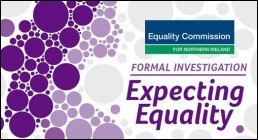
The 32nd Monitoring Report presents an aggregated summary of the 3,879 valid monitoring returns received during 2021 from 105 public authorities and 3,474 private sector concerns. These returns were mostly received between 1st January and 31st December 2021, with a period of extension granted to some companies due to the Covid-19 pandemic.
This year’s report shows the Protestant community share of the monitored workforce was [50%] and the Roman Catholic community share was [50%].
In 2021, the Roman Catholic community composition of the monitored workforce was 1.1 pp lower than the broad approximation of Roman Catholics available for work. The Roman Catholic community composition of the monitored workforce once again approximates estimates of those available for work as taken from the Labour Force Survey.
For the thirteenth consecutive year, the Roman Catholic community [52.8%] comprised a greater proportion of
applicants than the Protestant community [47.2%].
In every year since 2006, members of the Roman Catholic community [52.7%] comprised a greater proportion of
appointees than did the Protestant community [47.3%]. In 2021, the Roman Catholic community share decreased by 0.7 percentage points from the previous year. Overall their share has increased by [7.9 pp] from [44.8%] in 2001.
In 2021, the Roman Catholic community [51.3%] comprised a greater proportion of
leavers than did the Protestant community [48.7%]. Overall, the Protestant community share of leavers has decreased by [7.1 pp] from [55.8%] in 2001.
Further information
Full details of the
32nd Fair Employment Monitoring report (2021) are available on our website
The Equality Commission has noted changes to the workplace and labour market over the course of the past three years, particularly with the outworkings of the UK’s decision to leave the EU, the impacts that the Covid 19 pandemic has had on the workplace, as well as a range of structural changes in workplace practices that have been noted since the Commission undertook its assessment of key inequalities in employment that it published in 2018.
This briefing paper provides a high-level overview of available literature and identifies the key issues in employment and work that may be affecting the equality groups and those who are members of the equality categories who enjoy rights and protections under the equality legislation.
 The Equality Commission conducted a formal investigation into the employment experiences of pregnant women and mothers, on maternity leave and on their return to work.
The Equality Commission conducted a formal investigation into the employment experiences of pregnant women and mothers, on maternity leave and on their return to work.
We explored whether pregnant women and mothers receive equal treatment in employment and identified both barriers to equality of opportunity and employment practices that women have found helpful and supportive.
Almost 1,000 women across Northern Ireland responded to an online survey sharing their experiences through focus group discussions and interviews. Employers were also given the opportunity to tell us about their experiences, concerns and good practices.
The findings were launched at Titanic, Belfast, on 29 November 2016 – read the press release
Download the investigation's findings:
Following the investigation the Commission produced new guidance for employers on pregnancy and maternity in the workplace:
If you would like to know more about the investigation please contact Rosalynd Harkness, email: Rharkness@equalityni.org, Tel: 028 90500574
The Commission’s formal investigation into the ‘Role of the Recruitment Sector in the Employment of Migrant Workers’ in 2010 found evidence of exploitation of migrant workers in Northern Ireland and revealed that despite a considerable body of legislation governing the sector, not all recruitment agencies worked within its terms and barriers to equality of opportunity existed for those who used their services.
For further information download:
We commissioned an expert paper on the type, extent and delivery of childcare provision necessary to maximise the economic participation of women within Northern Ireland. It makes the case for improvements in childcare that would allow women a more equal opportunity to work.
Download:
Childcare - Maximising the economic participation of women:
The Commission can conduct a
formal investigation under the provisions of most of the anti-discrimination legislation, currently excluding the sexual orientation employment legislation and age legislation, which only applies to employment and training.
In all cases we have the power to obtain information, make recommendations, issue reports, issue non-discrimination notices and use legally binding agreements or directions.
Formal investigations may be based on a general principle of achieving equality of opportunity under one of the discriminatory grounds, such as race, religion, sex, etc. If they are based on a belief that discrimination has occurred, they are confined to the investigation of a named person or persons.
Before undertaking an investigation we will consider the importance of the issue to equality and in the context of the strategic value of the investigation in relation to its current business objectives.
Investigations: